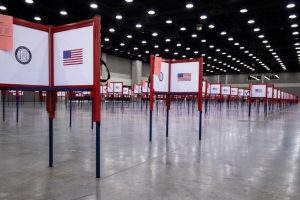How to improve the media's coverage of voting rights

New York (CNN Business)A version of this article first appeared in the “Reliable Sources” newsletter. You can sign up for free right here.
The fight over the next election is already underway. And it needs to be a focal point of the news media’s coverage in the months to come, because voting rights is the story that affects every other story.
The latest development: On Wednesday Senate Democrats introduced the For the People Act, the sweeping election and voting rights package that passed the House earlier this month. The package “would counteract Republican efforts at the state level to curb access to the ballot box,” CNN’s Kelly Mena wrote.
Republicans, through state-level efforts, are trying to make it harder for some citizens to vote. Democrats are generally trying to expand voting access. And some prominent Dems say news outlets are failing to give this issue the attention it deserves.
“While the physical attack on January 6 was well covered by the media, the equally damaging legal assault on voting has received relatively little attention,” Marc Elias, chair of Perkins Coie’s Political Law Group, told me.
Elias, a longtime Democratic voting rights lawyer, said he believes the “attack on voting rights” is “the most under-reported story right now.”
False balance in voting coverage?
“Under-reported” is not the same as “uncovered,” of course. (Elias ticked off some reporters when he tweeted about the dearth of coverage last month.) There has been strong reporting, to be sure. But Elias said he believes the media has an underlying challenge “covering stories about American democracy” because “reporters are uncomfortable treating one side as correct and one side as wrong on topics that they see as fundamentally about politics.”
Here’s the argument Elias made to me: “The typical structure of a story on voting rights thus becomes (1) Republicans are passing an unprecedented number of new voting restrictions; (2) Democrats and civil rights groups claim they will harm voters; (3) Republicans say its necessary to protect election integrity. In that structure, only the first of these is treated as a fact. They second and third are the competing claims of each side. This formula leads news outlets to report ‘big’ pieces about voting rights, with lots of facts and figures (section 1), followed by quotes from each side (sections 2 and 3).”
Elias said stories about First Amendment infringements are covered differently — without the both-sides structure — and that’s how voting rights should be approached too. Don’t view this “as a political story,” he argued, it’s a story “about our democracy.”
Reporters should ask for specifics
I raised this issue with Jennifer Morrell and Jessica Huseman on last Sunday’s “Reliable Sources.” Huseman is the editorial director of a brand new outlet, VoteBeat, which describes itself as a “pop-up nonprofit newsroom covering local election administration and voting in eight states.”
Huseman noted that voter fraud in various forms has been “a talking point for the far-right of the Republican Party for decades,” so President Trump’s election lies were “building on a decades-long historical base of false claims.” Thus, news outlets should call out this campaign for what it is — lies on top of lies, intended to suppress the vote.
Morrell, of The Elections Group, said “one of the most important things media need to do here is really push on these legislators who are claiming that they’re making these changes to increase voter confidence or to further secure the way voting is conducted.” Get specific, Morrell said, and see if they have any evidence — or if they’re just laundering the Big Lie from last year.
Bills should be based “on facts, not falsehoods”
The News Literacy Project weighed in on this problem the other day: “As numerous states consider steps to change the way voters participate in elections, we urge elected officials to base their actions on credible evidence.” The organization said the state-level bills premised on the Big Lie run counter “to our values and would do lasting harm to voting rights, which are among the most sacrosanct tenets of American democracy.”
Source: Read Full Article
